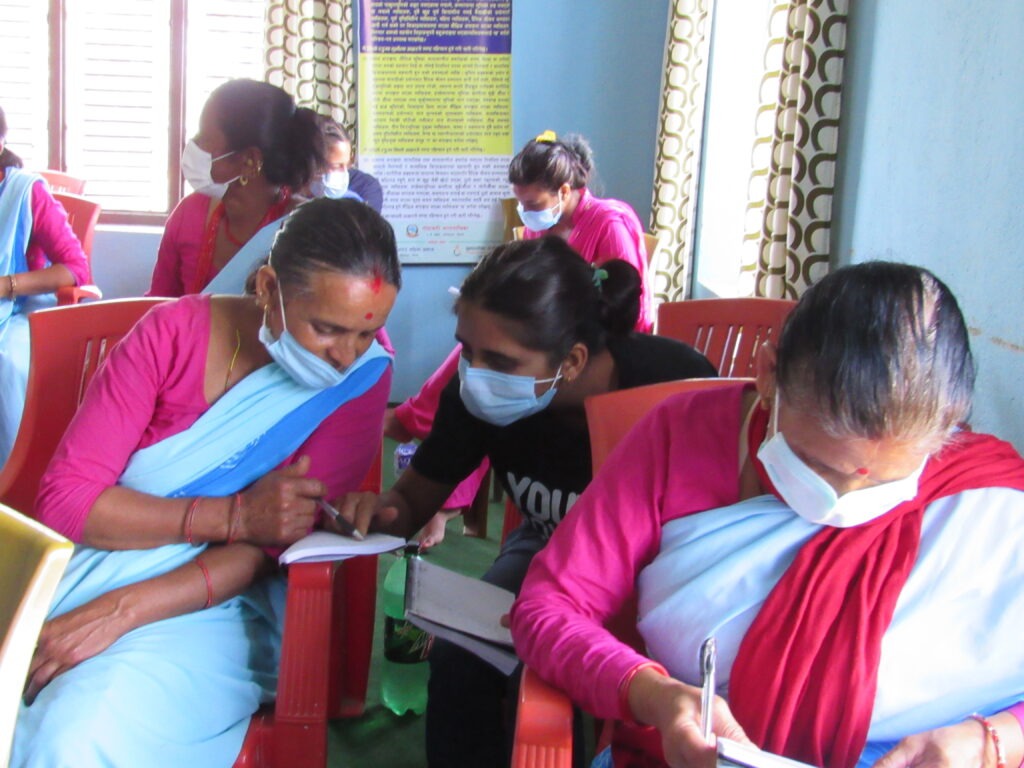Female Community Health Volunteers: The backbone of Nepal’s healthcare system.
Female Community Health Volunteers (FCHVs) form the first point of contact for basic health services in local communities for the treatment of common diseases. They deliver essential maternal and child healthcare and outreach services for immunisation. They also provide mental health support and help women facing gender-based violence.
The Psychological impact of COVID-19.
In several communities across Nepal, suicide rates and mental health issues have exponentially risen since the beginning of the pandemic. This has been linked to increasing levels of uncertainty and limitations on personal freedom caused by the lockdown. The pandemic has also had detrimental economic impacts on the population with widespread job losses, reduction income and return of migrant workers.
Nepal Government’s Response.
The Nepal government’s response to the crises mostly involved quarantine management, PCR testing, WASH distribution, and travel restrictions. However, interventions related to addressing the psychosocial impacts of the pandemic remained largely absent. The government invested in providing technical staff with the information and skills to contribute effectively to the response, but local actors such as FCHVs were left behind.
ICS Volunteers collaborating with Female Community Health Volunteers.
As primary healthcare workers providing essential health care services at the ward level, FCHVs were identified as an important group to mobilise to tackle the mental health challenges caused by the pandemic.
ICS community volunteers were trained and supported by Urjaa to work with the FCHVs to raise awareness on Covid-19, in particular around the effects of the pandemic on mental health.

The volunteers organised self-help groups for the FCHVs to enable and encourage mutual peer support. 58 FCHVs were then trained by external technical experts on providing mental health support. A second training focusing on the Community Informant Detection Tool (CIDT) to allow FCHVs to identify symptoms of depression, postnatal depression, epilepsy, alcoholism and other clinical mental illnesses was conducted.
Before I heard about psychosocial problems but was unaware of dealing with it. Now after the CIDT training I am able to categorise the mental health patients and refer them to the respective hospital. In that way, people will be able to get treatment in right place
Saraswati Timalsina, FCHV, Tikabhairav
Community volunteers supported the FCHVs to plan sessions based on the training they received for mothers in the community. During these sessions the FCHVs were able to share their knowledge about mental health and COVID with these women. They led mental health awareness sessions, individual counseling and at home visits with the help of resources provided by Urjaa.
Most of the women told me about their stress during that time but I had no idea on responding to that, but now I feel confident on dealing with issues in mental health.
Durga Timalsina, FCHV, Devichour
The community volunteers have continued to work together with the FCHVs to expand this approach and coordinate with community youth groups to organise awareness about the mental health impacts of COVID19.
Results from the survey.
Findings from a survey conducted by ICS community volunteers after this initiative shows that the psychosocial support provided by the FCHVs helped community members to better manage personal stressors, including those relating to mental health and economic concerns. It also helped increase knowledge on COVID19 prevention and response.
Earlier, I tried to conduct mental health sessions during group meetings but I wasn’t good at it and felt very uncomfortable. But now I feel confident and capable. All the credit for this change goes to the CIDT training that I received where we had an opportunity to learn about identifying cases of mental illness.
Geeta Pudasani FCHV, Devichour
Building resilience.
The 58 FCHVs have become a support structure embedded in the community, and beyond raising awareness and providing psychosocial support, have been able to contribute to building more resilience in communities in the longer term.
The power of community participation.
The collaboration between community volunteers and the FCHVs allowed both groups to reach a much larger group of people. Community-led approaches planned and delivered through community structures, along with buy-in from the local government proved effective in responding to issue at hand.
FCHVs, the ICS community volunteers and community youths from youth clubs were all based in the communities they served. They were native speakers of the local language and had a deep understanding of the socio-cultural context. This made it easier for them to relate to the challenges faced by community members, build trust, and gain wider community support for the messages being shared. Engaging mothers groups also allowed messages to reach the family level directly. Mobilising the FCHVs to respond to the mental health challenges communities were facing therefore proved to be an effective strategy for the community volunteers.



